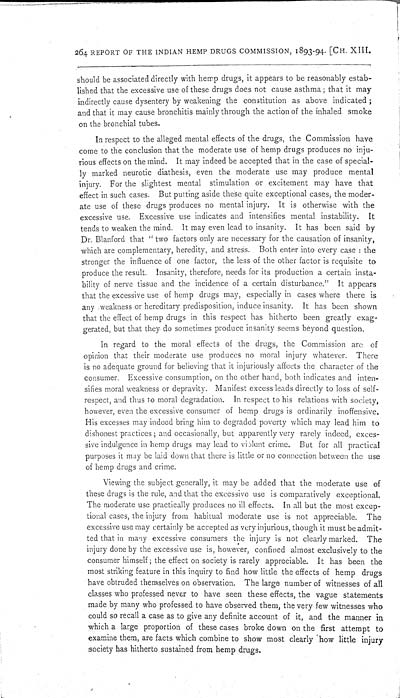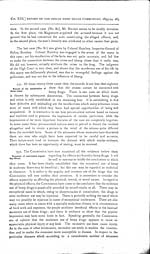Medicine - Drugs > Report of the Indian Hemp Drugs Commission, 1894-1895 > Volume I
(298) Page 264
Download files
Individual page:
Thumbnail gallery: Grid view | List view

264 REPORT OF THE INDIAN HEMP DRUGS COMMISSION, 1893-94. [CH. XIII.
should be associated
directly with hemp drugs, it appears to be reasonably estab-
lished that the excessive use of these drugs does not cause asthma;
that it may
indirectly cause dysentery by weakening the constitution as above
indicated;
and that it may cause bronchitis mainly through the action of the
inhaled smoke
on the bronchial tubes.
In respect to the alleged
mental effects of the drugs, the Commission have
come to the conclusion that the moderate use of hemp drugs produces
no inju-
rious effects on the mind. It may indeed be accepted that in the
case of special-
ly marked neurotic diathesis, even the moderate use may produce
mental
injury. For the slightest mental stimulation or excitement may have
that
effect in such cases. But putting aside these quite exceptional
cases, the moder-
ate use of these drugs produces no mental injury. It is otherwise
with the
excessive use. Excessive use indicates and intensifies mental
instability. It
tends to weaken the mind. It may even lead to insanity. It has been
said by
Dr. Blanford that "two factors only are necessary for the causation
of insanity,
which are complementary, heredity, and stress. Both enter into
every case: the
stronger the influence of one factor, the less of the other factor
is requisite to
produce the result. Insanity, therefore, needs for its production a
certain insta-
bility of nerve tissue and the incidence of a certain disturbance."
It appears
that the excessive use of hemp drugs may, especially in cases where
there is
any weakness or hereditary predisposition, induce insanity. It has
been shown
that the effect of hemp drugs in this respect has hitherto been
greatly exag-
gerated, but that they do sometimes produce insanity seems beyond
question.
In regard to the moral
effects of the drugs, the Commission are of
opinion that their moderate use produces no moral injury whatever.
There
is no adequate ground for believing that it injuriously affects the
character of the
consumer. Excessive consumption, on the other hand, both indicates
and inten-
sifies moral weakness or depravity. Manifest excess leads directly
to loss of self-
respect, and thus to moral degradation. In respect to his relations
with society,
however, even the excessive consumer of hemp drugs is ordinarily
inoffensive.
His excesses may indeed bring him to degraded poverty which may
lead him to
dishonest practices; and occasionally, but apparently very rarely
indeed, exces-
sive indulgence in hemp drugs may lead to violent crime. But for
all practical
purposes it may be laid down that there is little or no connection
between the use
of hemp drugs and crime.
Viewing the subject
generally, it may be added that the moderate use of
these drugs is the rule, and that the excessive use is
comparatively exceptional.
The moderate use practically produces no ill effects. In all but
the most excep-
tional cases, the injury from habitual moderate use is not
appreciable. The
excessive use may certainly be accepted as very injurious, though
it must be admit-
ted that in many excessive consumers the injury is not clearly
marked. The
injury done by the excessive use is, however, confined almost
exclusively to the
consumer himself; the effect on society is rarely appreciable. It
has been the
most striking feature in this inquiry to find how little the
effects of hemp drugs
have obtruded themselves on observation. The large number of
witnesses of all
classes who professed never to have seen these effects, the vague
statements
made by many who professed to have observed them, the very few
witnesses who
could so recall a case as to give any definite account of it, and
the manner in
which a large proportion of these cases broke down on the first
attempt to
examine them, are facts which combine to show most clearly how
little injury
society has hitherto sustained from hemp drugs.
Set display mode to: Large image | Zoom image | Transcription
Images and transcriptions on this page, including medium image downloads, may be used under the Creative Commons Attribution 4.0 International Licence unless otherwise stated. ![]()
| India Papers > Medicine - Drugs > Report of the Indian Hemp Drugs Commission, 1894-1895 > Volume I > (298) Page 264 |
|---|
| Permanent URL | https://digital.nls.uk/74574662 |
|---|---|
| Description | Chapter XIII, cont. |
| Description | [Volume 1]: Report. |
|---|---|
| Attribution and copyright: |
|




![Page [265]](https://deriv.nls.uk/dcn4/7443/74435012.4.jpg)